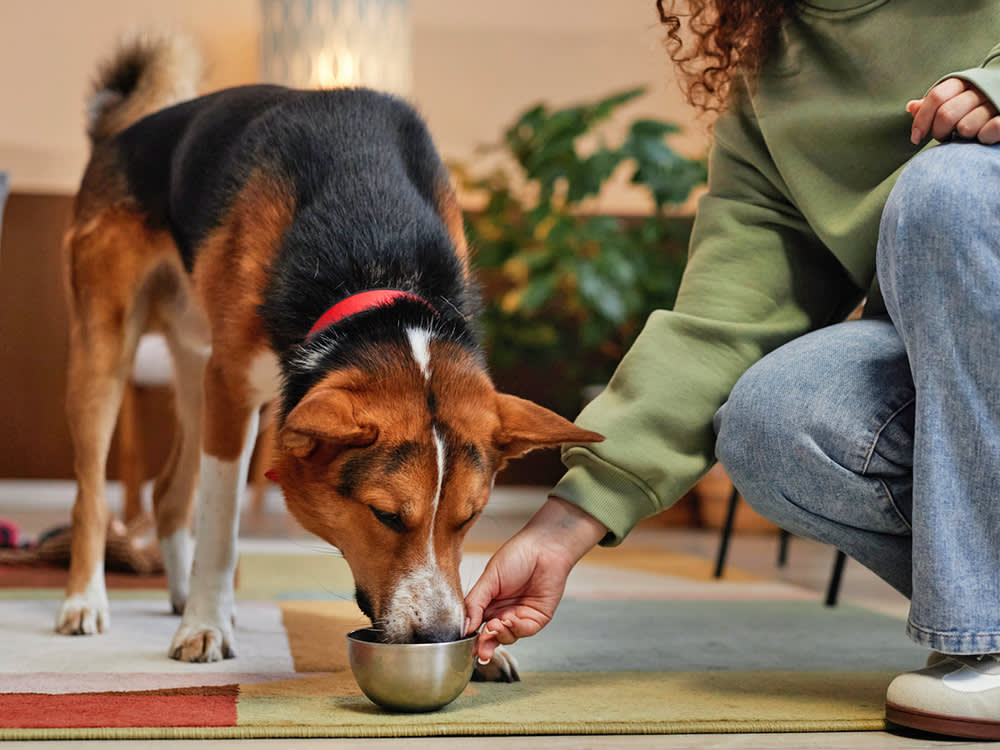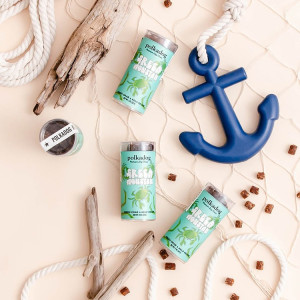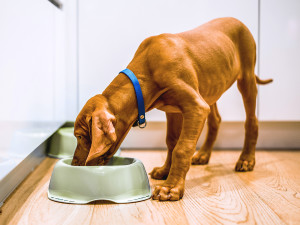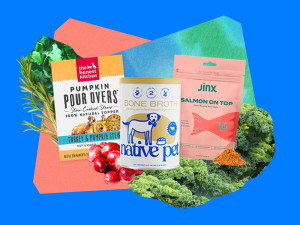Can Adult Dogs Eat Puppy Food?
They might still be your baby, but here’s why they need to eat like a grown-up.
In This Article:
What Is the Difference Between Adult and Puppy Food? Risks of Feeding Puppy Food to Adult Dogs When Might It Be Appropriate to Feed Puppy Food to Adult Dogs? Choosing the Right Adult Dog Food
While it’s tempting to share your puppy’s food with your adult dog, it’s important to understand the nutritional differences between the two formulas. Puppy food supports the rapid development and growth of young dogs, while adult dog food helps maintain a healthy weight and provides balanced nutrition.
What is the difference between adult and puppy food?
If you’ve ever introduced a new puppy into your pack, you’ve probably wondered if puppies and adult dogs can eat the same food. Feeding everyone the same thing would certainly make life easier, and it often seems like dogs are more interested in what’s in the other dog’s bowl than their own. There are so many options available for dog food: puppy versus adult, large breed versus small breed, canned versus dry, and more.
The differences between puppy and adult dog food come from the density of nutrients in the food. Growing puppies require increased amounts of many nutrientsopens in new tab in order to support muscle, bone, and brain formation. This means that puppy foods are generally more calorie dense and contain increased amounts of:
How much do you spend on your pet per year?
Amino acids
Protein
Fat
Calcium
Phosphorus
Copper
Risks of feeding puppy food to adult dogs
An adult dog sneaking occasional bites (or even pilfering whole meals) of your puppy’s food shouldn’t cause many problems beyond stomach upset. Feeding an adult dog a puppy diet long term could cause some problems though. Some potential problems to watch out for include:
Weight gain
Puppy diets tend to be calorie dense to help provide the energy that puppies need for play and proper growth. Giving a growth diet to an adult dog means you have to decrease the amount you feed to keep calorie intake appropriate and prevent obesity. No dog likes seeing a less-full food bowl, and it doesn’t take many extra kibbles to build into extra pounds over time.
Nutrient imbalances
The increased amounts of calcium and phosphorus in some puppy foods could cause issues for some adult dogs. Upper limits for the amount of these minerals that can be fed safely to adults have been established, and some puppy foods may exceed those amounts. Excess calcium or phosphorus can lead to changes in bone density, blood vessel calcification, or urine crystal formation.
Kidney issues
The higher protein content of puppy food can be hard on an older dog’s kidneys if they’ve lost kidney function with age. As kidney disease develops, the kidneys have a harder and harder time getting rid of the byproducts produced by the body’s use of protein for energy. Adult and senior dog diets are formulated with this in mind.
Despite these potential risks, the overall likelihood of harm from feeding an adult dog puppy food is low, but why risk it? There are diets optimized for your dog’s needs at each stage of their life and it’s easy to switch from one to another as your puppy grows up. If you feel your adult dog needs puppy food for whatever reason, be sure to talk to your veterinarian so they can check the nutrient content to make sure it’s safe.
When might it be appropriate to feed puppy food to adult dogs?
There are some situations in which feeding puppy food to an adult dog may be recommended. Always discuss diet changes with your dog’s vet before switching to make sure there are no problems or better solutions. Some situations where feeding a growth diet to an adult dog include:
Pregnant or nursing female dogs
Puppies need a lot of nutrients to grow, and mom provides all of them before birth and in the weeks after. Without taking in extra calories, amino acids, and minerals, a pregnant or lactating dog will lose weight and possibly become ill. Eclampsia due to low blood calcium is a common problem in both small lactating dogs and large dogs with big litters. The extra calcium in puppy food helps to prevent this disease.
Underweight or malnourished adult dogs
Some dogs can’t seem to keep weight on. Whether this is due to a high activity level, low appetite, or a health problem, underweight dogs may need a more calorie-dense food to help fill out. Puppy foods can be used for this, but they may not be the right answer for every dog.
Performance or working dogs
Dogs engaged in high-energy activities like search and rescue, agility trials, or intense training will need extra calories to keep their weight and conditioning at a good level. Puppy foods are nutrient-dense and may be considered for this, but there are more options available for these active dogs than there used to be. Performance diets are often more calorie-dense than puppy foods and contain appropriate nutrient ratios for adult dogs.
Choosing the right adult dog food
With the endless options available in stores and online, it can seem impossible to choose the right food for your adult dog. Dog food is a big business that has been growing rapidly, from $17.5 billion in 2010 to $64 billion in 2023 (in the U.S.). With this growth, there has been a big expansion in the types and brands of dog foods offered. To keep it simple in this crowded space, here are some things to consider when choosing the right food for your adult dog:
Look for balanced nutrient profiles
The good news is that there are established guidelines for formulating dog foods, based on feeding trials and extensive testing. These are called Association of American Feed Control Officials (AAFCO) guidelines. AAFCO is an organization consisting of state and federal government agencies from the U.S. and Canada that provides model feed standards for pets and livestock.
Reputable dog foods should feature one of these AAFCO statements on their labels:
Formulated to meet the nutritional levels established by the AAFCO Dog Food Nutrient Profiles for [life stage]
Animal feeding tests using AAFCO procedures substantiate that [diet] provides complete and balanced nutrition for [life stage]
Provides complete and balanced nutrition for [life stage] and is comparable in nutritional adequacy to a product that has been substantiated using AAFCO feeding tests.
These statements let you know if the diets were fed directly to dogs in a feeding trial or if they match the nutrient profile established by AAFCO. Feeding trials are expensive and time consuming, so most diets have the first statement.
The life stages specified on a dog food label can be gestation, lactation, growth, maintenance, or all life stages. Adult dogs should generally be fed a maintenance diet unless your vet advises otherwise. “All life stage” diets can be OK, but they are not balanced specifically for adult dogs.
Most dog foods you find in the pet store will have an AAFCO statement, but it’s always good to check to make sure the diet you’re choosing is backed up by research.
Consider your dog’s age, breed, size, and activity level
Pick a diet that fits your dog’s current life stage and lifestyle. Adult dog foods are often fed from one to seven years of age (depending on the breed), but you can always check the label to see when the manufacturer recommends changing to a senior diet. There are now some diets that are aimed at specific breeds. You don’t need to feed your dog a diet made especially for their breed, but it can make deciding on a diet easier for some people.
Each diet has its own calorie and nutrient density. There’s a lot of variation between brands and formulations. Pick a kibble size and flavor you think your dog will like and then stick with it if they’re doing well on that diet.
Consult with your veterinarian
Before your dog hits the one-year mark, talk to your vet about diets. They see a lot of dogs and often have an idea of what diets are working well for them. They can also help you calculate the appropriate amount to feed your dog, because the recommended feeding amounts can be a good start, but your vet can take your dog’s lifestyle and medical history into consideration.
Listen to your dog
This doesn’t mean that you should give your dog an entire block of cheese every time they ask for it. Just pay attention to how your dog is doing on their diet. In general, the best food for your adult dog is one that:
They like eating
You can afford
Is nutritionally balanced
Maintains normal poops and a healthy coat
Keeps them at a good body weight
Don’t stress out if you’re not feeding the highest-priced, best-marketed bag of dog food in the pet store. Find something that keeps your dog happy and healthy so that you can move on to the more important things in life: playing fetch.
FAQs (People also ask):
What is the difference between puppy food and dog food?
Puppy food is formulated to provide extra nutrition that puppies need for growth. Adult dogs don’t usually need those extra calories and nutrients, so regular dog food just provides what they need to maintain a healthy lifestyle.
Can it hurt an adult dog to eat puppy food?
Outside of some stomach upset, an occasional puppy food snack is unlikely to hurt your adult dog. Feeding an adult dog puppy food long term could result in weight gain or possibly some nutritional imbalances.
How long can you feed dog puppy food?
Puppies usually stay on puppy food until they’ve reached about 80 percent of their expected adult weight. This happens around a year of age for most dogs but may be later for some giant-breed dogs.













